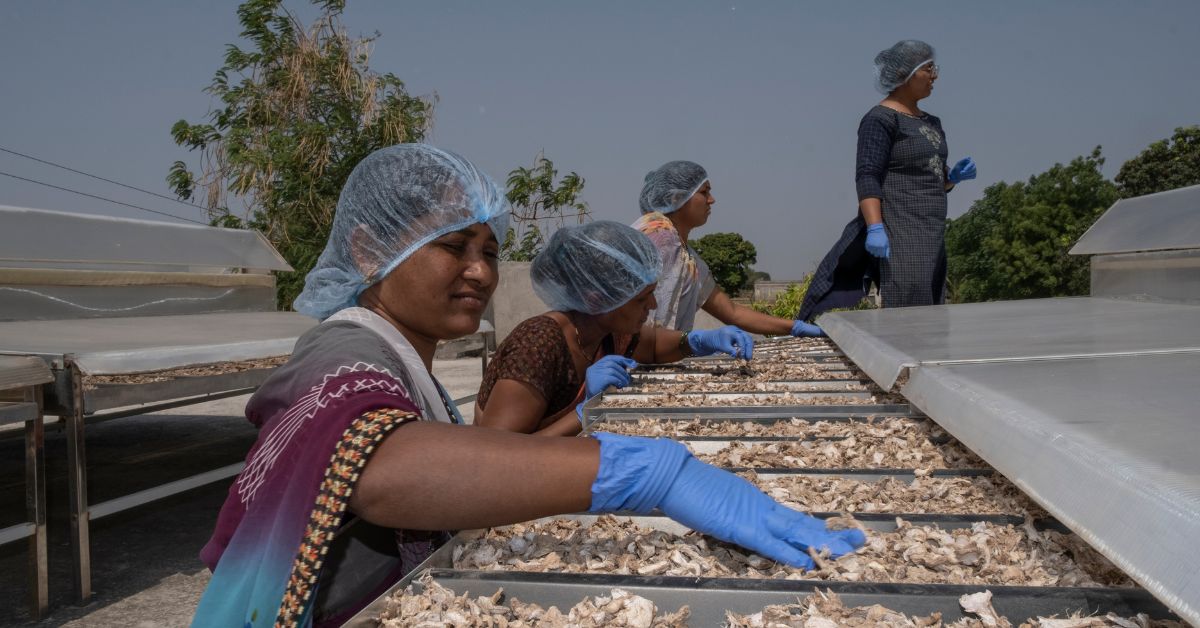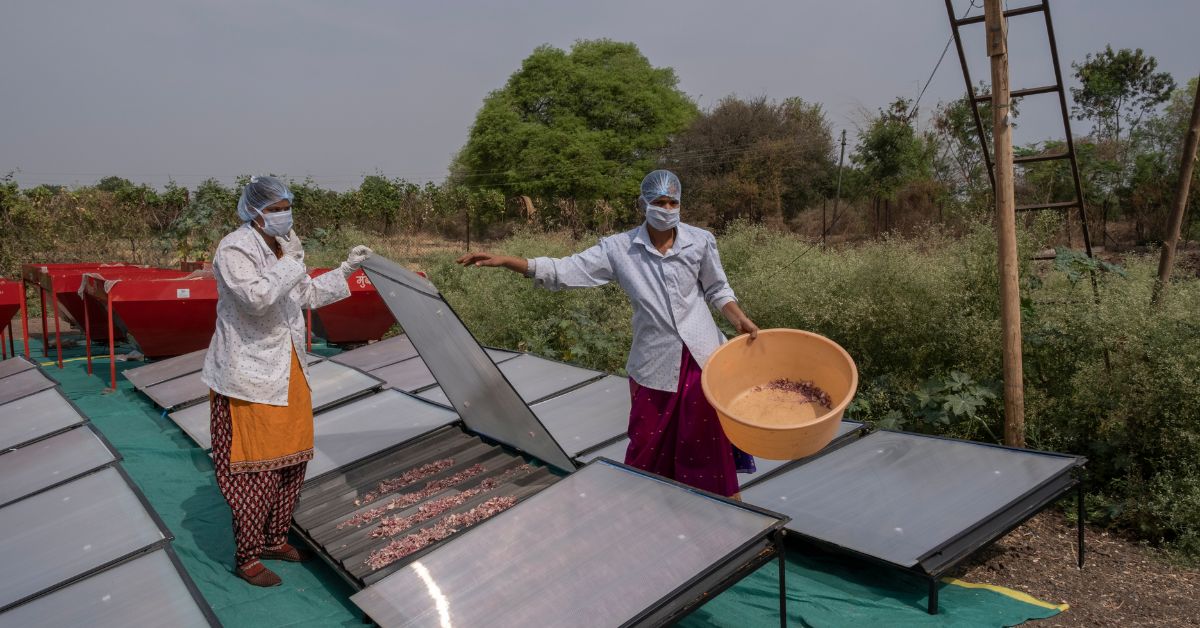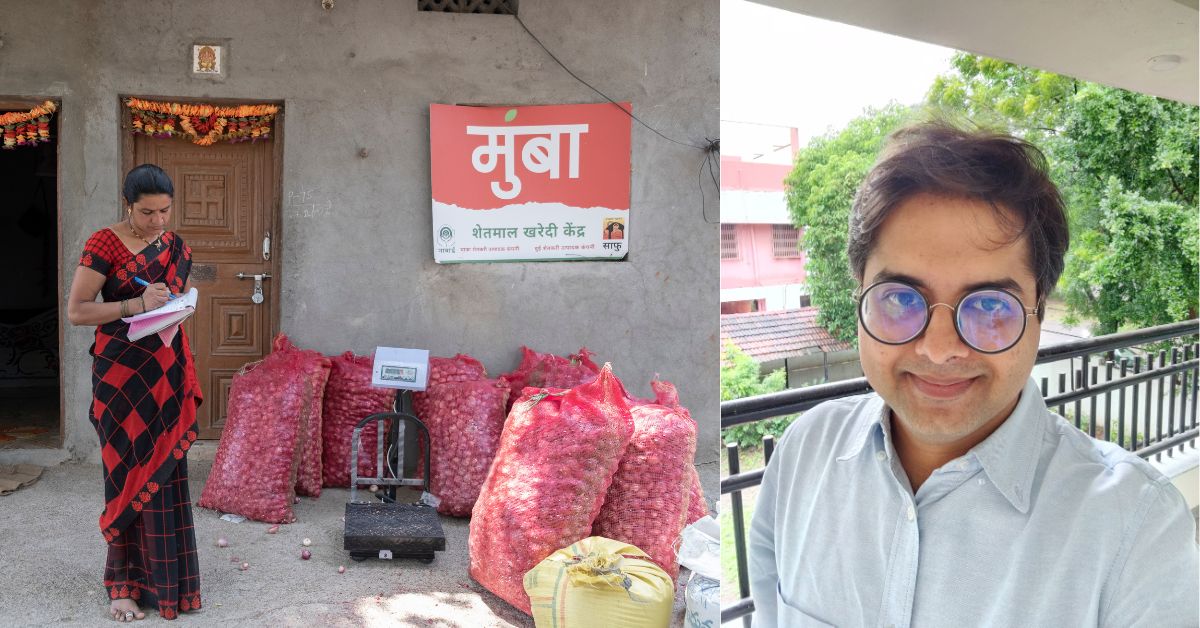In India, post-harvest losses are estimated to account for about 40 percent of total agricultural produce, leading to an economic loss of approximately $14 billion annually.
At Maharashtra-based brand Moomba, significant efforts are being made by creating a market for produce that would typically go to waste. Central to this initiative is the innovative use of solar-powered dehydration technology, which transforms discarded produce into high-quality, shelf-stable food ingredients. This also helps farmers generate additional income.
“By converting unsellable produce into marketable products, we empower over 3,500 women farmers who are now earning an additional income of Rs 50,000 to Rs 1 lakh annually. This income boost is crucial in breaking the debt cycle that traps many farmers, providing them with the financial stability needed to reinvest in their farms and improve their livelihoods,” shares Vaibhav Tidke, CEO and co-founder of S4S Technologies, an agricultural startup that launched its brand Moomba.
As of now, Moomba has successfully prevented 2 lakh tonnes of food from being wasted, significantly enhancing food security in communities.
By using renewable energy for food processing, the initiative reduces greenhouse gas emissions and promotes environmentally sustainable farming practices. “This approach has helped mitigate 1.8 million tonnes of CO2 emissions, making farming more resilient to unpredictable weather patterns and extreme climate events,” he says.

Additionally, Moomba is also fostering greater economic independence and promoting gender equality by empowering women farmers with the skills and knowledge to operate solar-powered technology and manage their businesses.
Adding value to discarded crop using solar energy
In 2019, Vaibhav Tidke, Swapnil Kokate, Tushar Gaware, Nidhi Pant, Ashwin Pawade, Ganesh Bhere, and Shital Somani co-founded S4S Technologies. Rooted in a shared vision, the seven friends from farming background came together to use their scientific knowledge and make a difference in the lives of smallholder farmers.
Sharing his insight on the post harvest losses, Vaibhav says, “This occurs due to various factors such as inadequate storage facilities, poor infrastructure, inefficient supply chains and lack of proper processing technology. It leads to economic loss as with reduced income from their crops, many small farmers are forced to take on more debt. This leads to a vicious cycle of poverty and indebtedness.”
Striving to work on solutions, Moomba procures damaged and lower-grade crops primarily from smallholder farmers at the farmgate. The startup employs its patented Solar Conduction Dryer (SCD) technology. It harnesses the sun heat to remove moisture from food items – fruits, vegetables, grains and spices – effectively dehydrating them.
The SCD is equipped with a transparent plastic cover that allows sunlight to penetrate and be absorbed by black-coated drying trays. The black food-grade coating maximises solar radiation absorption, heating the surface where the produce is placed.

The absorbed solar energy is then transferred through conduction to the produce, ensuring uniform and efficient dehydration. It is designed to be user-friendly, requiring minimal training, which empowers women farmers to operate it independently.
“This process extends the shelf life of the produce, transforming perishable crops into high-quality, shelf-stable food ingredients without relying on electricity or fossil fuels. Our technology exemplifies how simple, renewable energy solutions can drive economic independence and resilience in rural communities and help farmers secure a better future for themselves and their families,” says Vaibhav.
Bringing financial stability to 3,500 women
At Moomba, a wide variety of value-added products are being made using solar-powered technology. These include dehydrated fruits and vegetables such as potatoes, green chilli, green peas, garlic, onion, corn, ginger, tomato, spinach and pumpkin, which are processed into various forms like whole, chopped, minced, granules, powder, kibbled and sliced.

In addition to this, grains such as rice, soya and corn grits, breakfast cereals and pulses, are processed along with spices such as red chilli and turmeric. These value-added products not only preserve the nutritional content but also create new market opportunities, contributing to the economic empowerment of women farmers.
The company is associated with over 4 lakh smallholder farmers and has empowered 3,500 women. “These women have seen a significant increase in their monthly incomes, with many experiencing an income boost of 15-20 percent. On average, they have observed an increase of Rs 4,000 to Rs 8,000 in their monthly income. This income boost provides them greater financial stability and allows them to reinvest in their farms,” says Vaibhav.
Kashi Shivaji Pawar, who has been working with S4S Technologies for the past three years, was a landless farmer. Earlier, she worked as an agricultural labourer in fields owned by others. “I would have to go out in search of a job as far as two kilometres. After working all day under the harsh sunlight, I would hardly earn Rs 200 per day. I had to discontinue my daughter’s education after class 12,” she says.
“But, thankfully I was able to continue with it when I started working here. I am able to earn twice the amount up to Rs 400-450 per day. The centre is also nearby so it gets easier for me to look after my children as well. My daughter is now pursuing her graduation and also learning how to type,” adds the resident of Matrewadi village of Jalna district.
The company caters to 10,000 customers in large packaged food companies, cloud kitchens, Quick-Service Restaurants (QSRs), export houses, hotels, restaurants and the catering industry. The company’s annual revenue stands at Rs 200 crores.
Looking at the impact created by the company, Vaibhav says, “We’ve been able to address critical challenges like post-harvest losses, food waste and poverty by providing sustainable, solar-powered solutions that empower farmers to become entrepreneurs.”
“The ripple effect of our work is profound—every time we scale our operations, we enhance the livelihoods of those directly involved and drive broader systemic change within the communities we serve. The journey has been immensely fulfilling and knowing that our growth directly translates into meaningful, lasting impact for so many only deepens our commitment to expanding our reach and multiplying our efforts,” he adds.
Edited by Padmashree Pande. All photos: S4S Technologies.
Source:
Post harvest losses of fruits and vegetables in India: By Ramesh Kumar Sahni, published in September 2023.
India grows more food, wastes more, while more go hungry: By Rahul Shrivastava for India Today, published on 21 January 2021.
